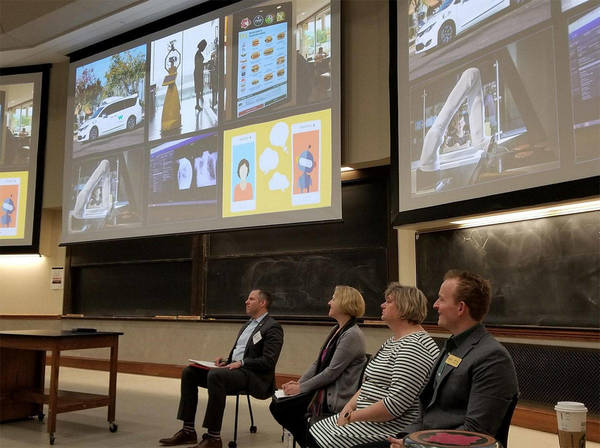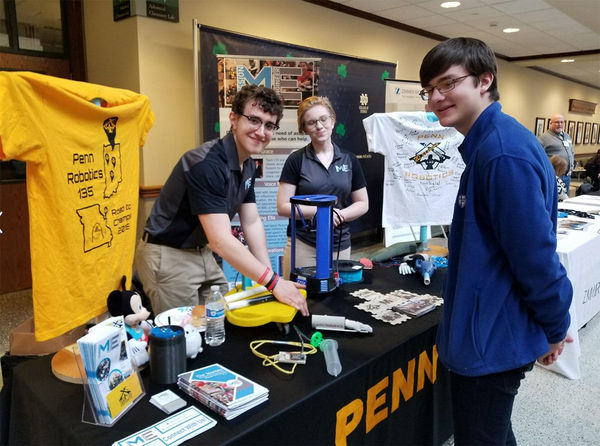
A second-grade teacher raises her hand and says she’s reluctant to tell her students that they need to think about a career path when they are seven years old. “They’re just babies,” she adds.

Panelists at the STEM Forum XII at Notre Dame last month agreed that second grade might be a little young, but waiting until eighth grade is considered too late in today’s connected and increasingly automated global economy.
“We need to push exploration in the upper elementary grades,” according to Carrie Lively, a former educator and administrator who now is senior director with the Indiana Office of Work Based Learning and Apprenticeship. “What we hear most from employers is: ‘I need people today’ and ‘I need to sustain long-term growth.’ “
All four panelists in the session entitled “Indiana Career Readiness Requirements” provided sobering statistics regarding the future workforce. For example, 40 percent of those attending a four-year college in Indiana will not complete a degree within six years and, in many cases, will be burdened with significant debt. Thirty percent of college freshmen drop out by the end of the year. On the other end of the equation, as baby boomers continue to retire, the job skills gap widens in the technical-skills arena. It is predicted that of 700,000 jobs that need to be replaced in the Hoosier state, only 300,000 of those will be filled because of lack of qualified workers.
Consider the fact that there are an average 559 students per guidance counselor in the state, according to Matt Davis, manager of training at ITAMCO, a precision gear manufacturer.
While the challenges are great, Chad Addie, workforce and education innovation regional coordinator, is passionate about adapting to the future needs of employers by collaborating with educators, industry and civic leaders. “I want to help change the face of education,” said Addie, a former K-12 school administrator who moderated the panel and helped organize this year’s STEM Forum led by Tom Loughran, adjunct professor of physics at Notre Dame. The forum has evolved over time to feature new aspects and innovations in STEM education.
Because the educational system has advocated primarily for students to attend four-year-colleges, changing that emphasis to provide others options including two-year degrees, apprenticeships and technical training is the new goal and challenge. New Indiana requirements, called “Graduation Pathways,” take effect for the class of 2023 and call for learning “employability skills” through nine different pathways such as research projects, civic engagement or work-based internships.
“You know sitting in the seats and just talking to your students is not going to be enough,” Ben Carter, director of Workforce Education and Innovation for the Indiana Department of Education, told the approximately 250 attendees at the forum. “You have to get them out in the community. You have to get them out… interacting with challenging problems.”

Mark Melnick, executive director, Workforce Strategic Partnerships, Ivy Tech Community College, and a previous technical training director with the international automotive company, Benteler, represents the intersection of academia and industry. He brings expertise from Germany where he has taken Hoosiers to visit the Benteler Academy in Paderborn.
He predicts a “tsunami of change” in the area of workforce development in the United States, where he said employers looking to hire qualified, skilled labor equipped to deal with emerging technology is akin to being in “a grocery store with empty shelves.”
Stuart Greene, a member of the South Bend Community School Corporation board, attended the seminar and learned from it. “The conference offered a wonderful example of how schools, the community, and state-level stakeholders can collaborate to ensure that students have clearly defined pathways to success,” he said. Greene is a retired professor at Notre Dame.
Other panels at the forum included Education Innovations led by Matt Modlin, director of digital innovation, South Bend Community School Corporation; Lifelong Learning Initiative, with Lawrence Greenspun, director of public sector engagement, Drucker Institute, and Community Impact moderated by Scott Ford, associate vice president of economic development, Notre Dame.
Originally published by at science.nd.edu on March 11, 2019.